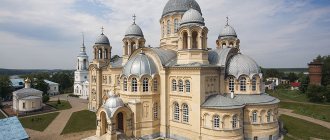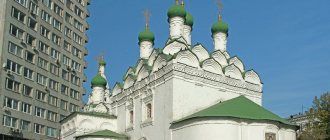Church of the Saints and Righteous Simeon the God-Receiver and Anna the Prophetess
The Church of Simeon and Anna (the official name is the Church of the Saints and Righteous Simeon the God-Receiver and Anna the Prophetess) is an active Orthodox church in St. Petersburg, located on the corner of Belinsky and Mokhovaya streets, an architectural monument, one of the oldest churches in St. Petersburg.
A wooden church on this site was built back in 1712, by order of Peter I in honor of the name day of his eldest daughter, Tsarevna Anna Petrovna. In 1731, a stone church was built near it (architect M.G. Zemtsov), in the Anninsky Baroque style using elements of Old Russian architecture. It was built by order of Empress Anna Petrovna, whose namesake was celebrated on the day of remembrance of Sts. Simeon and Anna. Three years later, construction was completed and the church was consecrated on January 27, 1734. The temple was included in the court (until 1802). Before the construction of the Kazan Cathedral, all the clergy gathered there on special days.
In memory of the birth of Paul I, a chapel to the Great Martyr was built in the church. Eustathius Plakida (chapel abolished in 1802). In 1797, Paul I awarded this church the Order of St. Anna. The main altar of the temple is consecrated in the name of Simeon the God-Receiver and Anna the Prophetess, the right (south) - in the name of Archangel Michael, and the left (north) - in the name of St. Ephraim the Syrian. The main volume is completed with a high light drum, topped with a faceted dome of a complex pattern. The iconostasis was made by carver K. Gan, the images were made by artists A. M. Matveev and V. I. Vasilevsky.
The bell tower of the church (47 meters high) once housed a striking clock. However, they were lost at the end of the 18th century. The bell tower spire was erected by the Dutch master G. van Boles.
In 1803 - 1808, the architect M. P. Vyborov added a sacristy and a chapel. In 1869 - 1872 it was expanded and updated by the architect G.I. Winterhalter, in particular, built another chapel above the sacristy in the name of the “Three-Handed” icon of the Mother of God, consecrated on October 17, 1871. Now this icon is in the St. Nicholas Naval Cathedral. Since 1868, a society for helping the poor operated, running an orphanage and an almshouse.
In January 1938, the church was closed, its property and decorations were looted, and the premises were converted into a warehouse. In 1951 - 1954, the church was restored, and in the 1980s it was adapted into a meteorological museum. In 1991 it was returned to believers, and on January 1, 1995 it was consecrated again.
Temple address: 191028, St. Petersburg, st. Belinskogo, 6 (Mokhovaya St., 48) Telephone, 279-87-79. Directions: metro stations “Gostiny Dvor”, “Nevsky Prospekt”, “Mayakovskaya”, “Ploshchad Vosstaniya”, “Chernyshevskaya”.
| Church of the Saints and Righteous Simeon the God-Receiver and Anna the Prophetess. Photo: November 2006. |
| Coat of arms on the wall of the church. |
| Church from the street. Mokhovaya. |
| Church from the street. Belinsky (formerly Simeonovskaya street). |
| South facade of the church. |
| Church of the Saints and Righteous Simeon the God-Receiver and Anna the Prophetess. Photo: June 2008. |
| Church of the Saints and Righteous Simeon the God-Receiver and Anna the Prophetess. Photo: May 2013. |
| Church of the Saints and Righteous Simeon the God-Receiver and Anna the Prophetess. Photo: May 2013. |
| Church of the Saints and Righteous Simeon the God-Receiver and Anna the Prophetess. Photo: May 2013. |
| Church of the Saints and Righteous Simeon the God-Receiver and Anna the Prophetess. Photo: May 2013. |
| Church of the Saints and Righteous Simeon the God-Receiver and Anna the Prophetess from the side of the Fontanka River. Photo: May 2013. © Vozlyadovskaya A.M., Guminenko M.V., photo, 2008-2013 |
| Go back to the main page |
Belinsky's letter to Gogol
Shortly before the physical death of Belinsky and after the literary death of Gogol, from whom, by his own admission, “his talent left,” the relationship between these historically great people developed tragically. After the publication of the first volume of Dead Souls, Gogol, of all that he wrote for the second volume of Dead Souls, recognized only one fragment worthy of his former talent - “The Tale of Captain Kopeikin.” Gogol's greatest spiritual tragedy began from the moment he realized the loss of his former talent. Depression set in. The former Genius was tossing about in the grip of hopelessness. In this state he publishes his “Selected Passages from Correspondence with Friends.” Gogol's new works testified to his departure from the spirit of his previous brilliant works.
After Gogol published “Selected Passages from Correspondence with Friends,” Belinsky wrote a review of the work, in which he criticized the writer’s new work. I especially liked that part of “Selected Places...”, where Nikolai Vasilyevich begins to praise Russian Orthodoxy.
Gogol was offended by the review and wrote a letter to the critic. Belinsky wrote a response letter for several days, rewriting the final version of the letter twice.
There could be no question of publishing such a letter in the official Russian press. On the way from Salzbrunn to Russia, Belinsky stopped in Paris, where he met with Herzen and read him his letter to Gogol. Herzen immediately told his friends in exile about this and remarked: “This is a brilliant thing, and this, it seems, is his will.” Belinsky's letter reached Gogol. Gogol first wrote a long answer, but “torn it to shreds” and in his short reply expressed his readiness to admit “part of the truth” to Belinsky. Belinsky's letter to Gogol circulated in Russia in handwritten form, with some very minor distortions. The letter was first published by Herzen in 1855 in the journal Polar Star.
Letter from V.G. Belinsky was written more than 165 years ago, but the thoughts expressed in it are perfectly in tune with the events and conditions of life in modern times. Nothing said by the “furious Vissarion” is outdated. Each of his sentences, with the exception of references to serfdom, seems to be written on scientifically generalized and painfully reflected abundant material from modern life in Russia. None of his biased statements can be refuted.
You are only partly right in seeing an angry person in my article: this epithet is too weak and gentle to express the state into which reading your book brought me. But you are completely wrong in attributing this to your, indeed not entirely flattering, reviews of the admirers of your talent. No, there was a more important reason. The offended feeling of pride can still be endured, and I would have the sense to remain silent about this subject if the whole point was only about it. But one cannot endure an offended sense of truth and human dignity. It is impossible to remain silent when, under the cover of religion and the protection of the whip, lies and immorality are preached as truth and virtue.
... I am not able to give you the slightest idea of the indignation that your book aroused in all noble hearts, nor of the cry of wild joy that all your enemies - both literary ones (Chichikovs, Nozdrevs, Mayors and etc.) and non-literary ones whose names you know.
You yourself see clearly that even people, apparently of the same spirit as its spirit, have abandoned your book. Even if it had been written as a result of deeply sincere conviction, then it should have made the same impression on the public... ...You haven’t noticed that Russia sees its salvation not in mysticism, not in asceticism, not in pietism, but in success civilization, enlightenment of humanity. She does not need sermons (she has heard them enough!), not prayers (she has repeated them enough!), but the awakening in the people of a sense of human dignity, how many centuries have been lost in dirt and dung, rights and laws consistent not with the teachings of the church, but with common sense and justice, and their strict implementation, if possible
... These are the questions with which Russia is anxiously occupied in its apathetic half-asleep!
And at this time, the great writer, who with his marvelous artistic creations so powerfully contributed to the self-awareness of Russia, giving her the opportunity to look at herself as if in a mirror, appears with a book in which, in the name of Christ and the church, he teaches the barbarian landowner to profit from the peasants more money, cursing them with “unwashed snouts”!.. And this shouldn’t have made me indignant?!. Yes, if you had discovered the attempt on my life, then I would have hated you no more for these shameful lines... And after that you want people to believe the sincerity of the direction of your book?! No! If you had truly been filled with the truth of Christ, and not the teachings of the devil, you would have written very differently to your landowner adept.
You would write to him that since his peasants are his brothers in Christ, and since a brother cannot be the slave of his brother, he must either give them freedom, or at least use their labors as favorably as possible for them, recognizing himself , in the depths of your conscience, in a false position in relation to them... And your concept of national Russian court and punishment, the ideal of which you found in the words of a stupid woman from Pushkin’s story and according to whose reason, supposedly, should flog both the right and the guilty?
Yes, this is often done in our country, although most often only the rightist is flogged if he has nothing to pay off - to be guilty without guilt. And such and such a book could be the result of a difficult internal process, high spiritual enlightenment?! It can’t be!.. Or you are sick and you need to rush to get treatment; or - I don’t dare complete my thoughts... Preacher of the whip, apostle of ignorance, champion of obscurantism and obscurantism, panegyrist of Tatar morals - what are you doing?! Look at your feet: after all, you are standing over the abyss... That you base such a teaching on the Orthodox Church - I still understand this: it has always been the support of the whip and the servant of despotism
.
But Christ, why did you mix Christ in here?! What have you found in common between Him and any church, especially the Orthodox Church? He was the first to announce to people the teachings of freedom, equality and fraternity, and he sealed martyrdom and established the truth of his teaching. And it was only the salvation of people until it was organized into a church and accepted the principle of orthodoxy as its foundation. The Church was a hierarchy, therefore, a champion of inequality, a flatterer of power, an enemy and persecutor of brotherhood between people - which it continues to be to this day.
But the meaning of Christ’s teaching was discovered by the philosophical movement of the last century.
And this is why some Voltaire, who extinguished the fires of fanaticism and ignorance in Europe with an instrument of ridicule, is, of course, more a son of Christ, flesh of his flesh and bone of His bones, than all your priests, bishops, metropolitans and patriarchs, Eastern and Western. Don't you know this? But all this is now not news at all for every high school student... And therefore, did you, the author of “The Inspector General” and “Dead Souls,” really, really, from the heart, sing a hymn to the vile Russian clergy, placing them immeasurably higher than the Catholic clergy? Suppose you do not know that the Catholic clergy was something, while the Orthodox clergy has never been anything, anywhere, except as a servant and slave of secular power. But do you really not know that our clergy is held in universal contempt by Russian society and the Russian people? Who do the Russian people tell obscene tales about?
About the priest, the priest, the priest’s daughter, the priest’s worker. Who do the Russian people call: foolish breed, kolukhany, stallions? - Popov. Isn’t there a priest in Rus', for all Russians, a representative of gluttony, stinginess, sycophancy, and shamelessness? And as if you don’t know all this?
Strange! In your opinion, the Russian people are the most religious people in the world?
- Lie! The basis of religiosity is pietism, reverence, and fear of God.
And the Russian man pronounces the name of God while scratching his ass.
He says about the icon: “It’s good for praying, it’s not good for covering pots.” Take a closer look and you will see that this is a deeply atheistic people by nature.
There is still a lot of superstition in him, but there is not a trace of religiosity.
Superstition passes with the success of civilization, but religiosity often gets along with it.
A living example is France, where even now there are many sincere, fanatical Catholics among enlightened and educated people, and where many, having abandoned Christianity, still stubbornly stand for some kind of God. The Russian people are not like that: mystical exaltation is not at all in their nature. He has too much against this common sense, clarity and positivity in his mind: this is, perhaps, the enormity of his historical destinies in the future. Religiosity was not instilled in him even among the clergy, for a few isolated, exceptional individuals, distinguished by quiet, cold, ascetic contemplation, do not prove anything. The majority of our clergy have always been distinguished only by their fat bellies, theological pedantry and wild ignorance.
It is a sin to accuse him of religious intolerance and fanaticism.
He can rather be praised for his exemplary indifference in the matter of faith. Religiosity manifested itself in our country only in schismatic sects, so opposed in spirit to the mass of the people and so insignificant in number compared to it. I will not dwell on your praise of the love affair of the Russian people with their bishops.
I’ll tell you straight: this dithyramb did not meet with anyone’s sympathy and brought you down in the eyes of even people who were in other respects very close to you in their direction... I will only note one thing: when a European, especially a Catholic, is possessed by a religious spirit, he becomes an exposer of unjust power , like the Jewish prophets, who denounced the iniquity of the mighty of the earth.
In our country, on the contrary, if a person (even a decent one) suffers from the disease known among psychiatrists under the name mania religiosa, he will immediately smoke the earthly God more than the heavenly one, and what’s more, it’s enough that the heavenly and earthly God would like to reward him for slavish zeal, but he sees that by this he would compromise himself in the eyes of society...
Our believing brother, a Russian man, is a beast! I also remembered that in your book you assert as a great and indisputable truth that literacy is not only not useful for the common people, but positively harmful. What should I tell you about this? May your Byzantine God bless you for this Byzantine thought. Did you know what you were doing when you committed such a thought to paper?
...Not without a certain sense of self-satisfaction I will tell you that it seems to me that I know the Russian public a little. Your book scared me with the possibility of bad influence on the government, on censorship, but not on the public. When a rumor spread in St. Petersburg that the government wanted to print your book among many thousands of copies and sell it at the lowest price, my friends became despondent. But I then told them that, no matter what, the book would not be a success and would soon be forgotten. And indeed, she is now more memorable for all the articles about her than for herself. Yes! The Russian person has a deep, although not yet developed, instinct for truth! Your appeal, perhaps, could have been sincere. But the idea of bringing your appeal to me to the attention of the public was a most unfortunate one. The times of naive piety are long gone for our society. ...As for me personally, I repeat to you: you were mistaken in considering my article an expression of annoyance for your review of me as one of your critics. If only this had made me angry, I would only respond to this with annoyance, and about everything else I expressed myself calmly and impartially. And it’s true that your review of former admirers is doubly bad... It was your book in front of me, not your intentions. I read and re-read it a hundred times and still did not find anything in it other than what is written in it. And what is in it deeply outraged and offended my soul. If I gave full vent to my feelings, this letter would soon turn into a thick notebook. I never thought of writing to you about this subject, although I painfully wanted it and although you gave everyone in print the right to write to you without ceremony, bearing in mind one truth... I don’t know how to speak halfway, I don’t know how to be cunning - that’s not the point. my nature. Let you or time itself prove to me that I am wrong in my conclusions, I will be the first to rejoice at this, but I will not repent of what I told you. This is not about my or your personality, but about an object that is much higher not only than me, but even you. And here is my last, final word: if you had the misfortune with proud humility to renounce your truly great works, then now you must with sincere humility renounce your last book and atone for the grave sin of publishing it with new creations that would remind you of your previous ones .
Salzbrunn July 15, 1847.
]]>]]>Source]]>]]>











